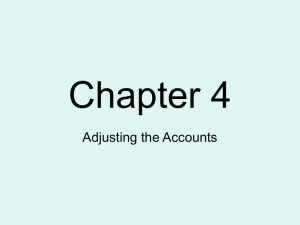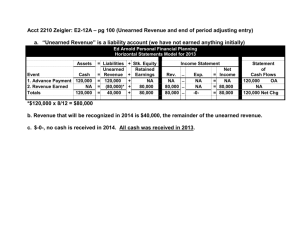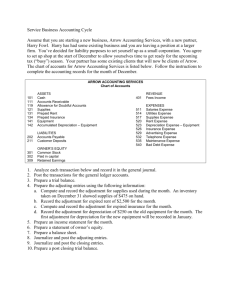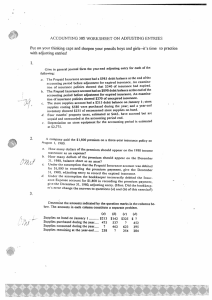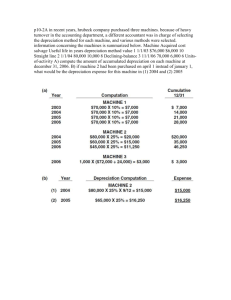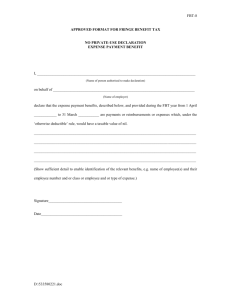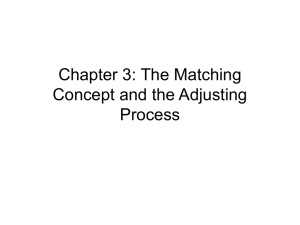Time Period Assumption Revenue Recognition Principle Matching
advertisement
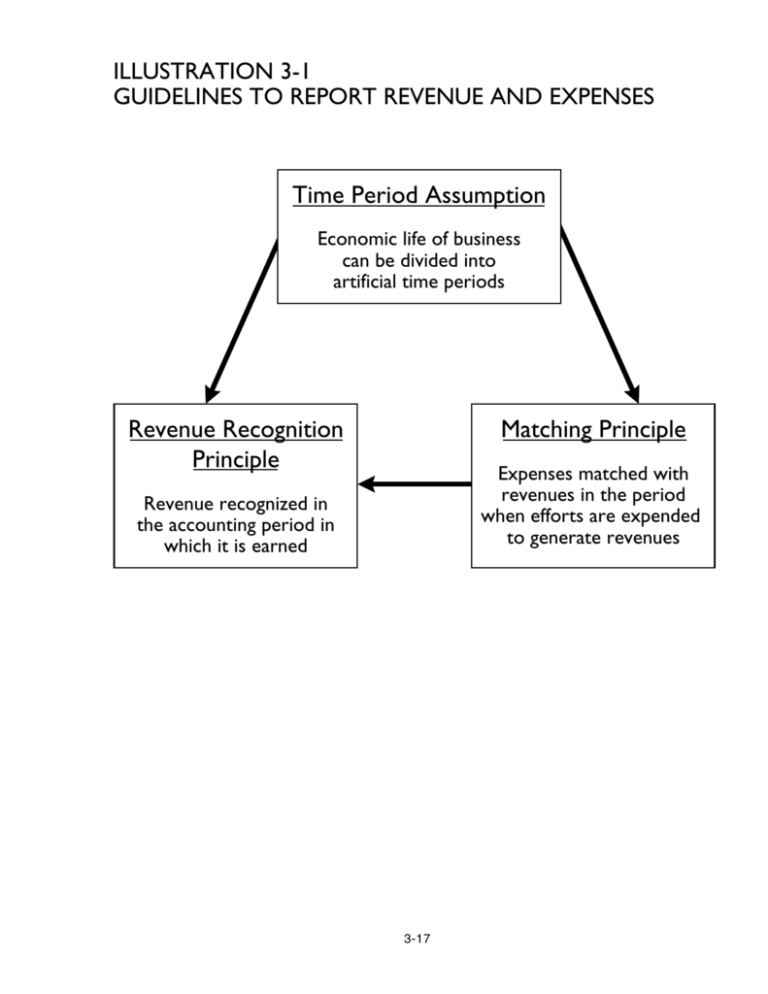
ILLUSTRATION 3-1 GUIDELINES TO REPORT REVENUE AND EXPENSES Time Period Assumption Economic life of business can be divided into artificial time periods Revenue Recognition Principle Matching Principle Expenses matched with revenues in the period when efforts are expended to generate revenues Revenue recognized in the accounting period in which it is earned 3-17 ILLUSTRATION 3-2 DEPRECIATION PREPAYMENT ASSET EXPENSE Cost of Truck $15,000 2001 1/1/01 2002 12/31/01 2003 12/31/02 12/31/03 ENTRY: Truck 15,000 Cash 15,000 Depreciation Expense 5,000 Accumulated Depreciation 5,000 ASSET Depreciation Expense 5,000 EXPENSE Accumulated Depreciation CONTRA ASSET 5,000 Depreciation Expense 5,000 Accumulated Depreciation 5,000 Statement Presentation: Balance Sheet Asset Truck $15,000 Contra Asset Less: Accum. Depr. 5,000 Book Value $10,000 3-18 $15,000 $15,000 10,000 $ 5,000 15,000 $ –0 – ILLUSTRATION 3-3 PREPAYMENT RELATIONSHIPS PREPAYMENTS Benefits More Than One Accounting Period RECORD AS ASSET RECORD AS LIABILITY Prepaid Insurance 1,200 Cash 1,200 (Acquired one year policy) Initial Entry Insurance Expense 100 Prepaid Insurance 100 (One month expired) Adjusting Entry Cash 6,000 Unearned Rent 6,000 (Received one year's rent) Unearned Rent Rent Revenue (One month elapsed) 500 500 Benefits Consumed or Earned in Current Period Account Effects: Balance Sheet Prepaid Insurance 1,200 100 Bal. 1,100 Unearned Rent 500 6,000 Bal. 5,500 Income Statement Insurance Expense 100 Rent Revenue 500 3-19 ILLUSTRATION 3-4 ACCRUAL RELATIONSHIPS ACCRUALS Expense or Revenue Not Yet Recorded RECORD EXPENSE Salary Expense 500 Salaries Payable 500 (Accrued salary owed) Salaries Payable Cash (Paid salaries) 500 500 RECORD REVENUE Adjusting Entry Accounts Receivable 1,000 Service Revenue 1,000 (Accrued revenue for services provided) Subsequent Entry Cash 1,000 Accounts Receivable 1,000 (Collected account receivable) 3-20 1. Prepaid Expenses Account Balances Before Adjustment (a) Prepaid expenses originally recorded in asset accounts have been used. Assets Overstated Expenses Understated 3-21 2. Unearned Revenues (b) Unearned revenues initially recorded in Liabilities Overstated Revenues Understated liability accounts have been earned. 3. Accrued Revenues 4. Accrued Expenses Adjusting Entry Dr. Expenses Cr. Assets Dr. Liabilities Cr. Revenues (c) Revenues earned but not yet received in cash or recorded. Assets Understated Revenues Understated Dr. Assets Cr. Revenues (d) Expenses incurred but not yet paid in cash or recorded. Expenses Understated Liabilities Understated Dr. Expenses Cr. Liabilities Each adjusting entry affects a balance sheet account and an income statement account. ILLUSTRATION 3-5 TYPES OF ADJUSTING ENTRIES Type of Adjustment Reason for Adjustment ILLUSTRATION 3-6 EXAMPLES OF ADJUSTING ENTRIES Instructions: For each entry indicate the name of the account debited and account credited. Adjusting Entry 1. To record expired rent which had been prepaid. 2. To record supplies used during the period. 3. To record depreciation on furniture. 4. To record unearned revenue that has been earned. 5. To record salary owed but not paid. 6. To record rent earned but not recorded. Account Debited Account Credited Answer: Account Debited 1. Rent Expense 2. Supplies Expense 3. Depreciation Expense 4. Unearned Revenue 5. Salary Expense 6. Rent Receivable Account Credited Prepaid Rent Supplies Accumulated Depreciation Revenue Salary Payable Rent Revenue 3-22 ILLUSTRATION 3-7 POSTING OF ADJUSTING ENTRIES The following unadjusted accounts and related balances are provided at September 30: Accounts Receivable $ 2,400 Supplies 1,200 Salary Payable –0– Unearned Revenue 500 Revenue 15,000 Salary Expense 2,100 Depreciation Expense –0– Accumulated Depreciation 3,000 Instructions: Open T-accounts and post the adjusting entries indicated from the following data. (a) Supplies on hand, $200. (b) Revenue earned but not accrued, $900. (c) Unearned revenue earned but not recorded, $400. (d) Salary owed to employees, $700. (e) Depreciation of $200 is recognized. Answer: Accounts Receivable 2,400 (b) 900 3,300 Unearned Revenue (c) 400 500 100 Revenue 15,000 (b) 900 (c) 400 16,300 Supplies 1,200 (a) 1,000 Salary Payable (d) 200 Supplies Expense –0– (a) 1,000 1,000 Depreciation Expense –0– (e) 200 200 3-23 –0– 700 700 Salary Expense 2,100 (d) 700 2,800 Accumulated Depreciation 3,000 (e) 200 3,200 ILLUSTRATION 3-8 REVIEW CHAPTER CONCEPTS Topic Applied Results Justification 1. Time Period Assumption Economic life of business is divided into time periods. To provide information to prepare financial statements and tax return. 2. Revenue Recognition Revenue is recorded in period earned. Requires adjusting entries. To record assets or decreases in liabilities and proper reporting of revenue earned. 3. Matching Prinicple Record expenses in the period they occur. Requires adjusting entries. To record liabilities or use of assets and expenses incurred in earning revenues. 4. Accrual Basis Accounting Applies revenue recognition principle, matching principle, and time period assumption. To record revenue when earned and expenses when incurred. 3-24 ILLUSTRATION 3-9 PREPAYMENT–ALTERNATIVE TREATMENT PREPAYMENTS Benefits More Than One Accounting Period RECORD AS EXPENSE RECORD AS REVENUE Insurance Expense 1,200 Cash 1,200 (Acquired one year policy) Initial Entry Cash 6,000 Rent Revenue 6,000 (Received one year's rent) Prepaid Insurance 1,100 Insurance Expense 1,100 (Eleven months unexpired) Adjusting Entry Rent Revenue 5,500 Unearned Rent 5,500 (Eleven months unearned) Account Effects: Balance Sheet Prepaid Insurance 1,100 Unearned Rent 5,500 Income Statement Insurance Expense 1,100 1,200 Bal. 100 Rent Revenue 5,500 6,000 Bal. 500 3-25

